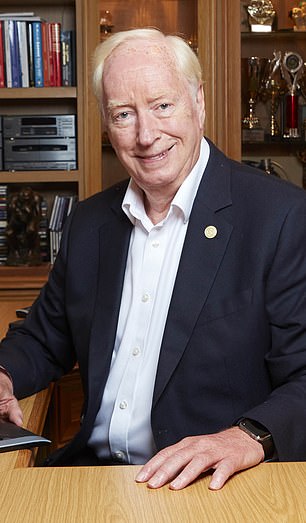Table of Contents
- John Neill: “It would be a disaster” if the country returned to the union disputes of the 1970s
- There are already fears that the Labour Party is losing control of industrial relations
- Neill believes wealth taxes will drive away talent and hurt the economy
Retirement: When John Neill took over Unipart, the company was on strike.
One of Britain’s most respected industrialists warned Labour this weekend against returning to “the bad old days” of the 1970s, with rampant unions and high taxes on the wealthy.
John Neill, 77, who announced his retirement this week as chief executive of manufacturing giant Unipart, said it would be a “disaster” if the country returned to the union disputes that marked his early career at British Leyland.
There are already fears that the party is losing control of industrial relations, with rail unions announcing fresh strikes shortly after being offered a big pay rise.
He added that wealth taxes – a cornerstone of Labour’s plans to plug the public finance gap – would drive away talent and damage the economy.
Chancellor of the Exchequer Rachel Reeves is expected to impose heavy wealth taxes in her October budget to plug what she says is a £22bn-a-year hole in the public finances.
Economists said last week that a large portion of the alleged deficit is money she has set aside for pay raises for public sector workers.
Reeves says she has been handed the worst economic legacy since the Second World War, even though official figures on Thursday showed solid growth. Neill joined British Leyland in 1974, five years before the chancellor was born. Neill became managing director of the car parts division aged just 29.
When British Leyland collapsed, he organised a rescue and transformation of his division, which is now a successful company with sales of £1bn and 22,000 employees. When he took over in 1977, Unipart was mired in an 11-week strike.
Despite his youth, Neill immediately confronted the militants.
“When I joined, the unions ran the company,” he said. “I felt they needed to understand that I was the one in charge, not them. I had gotten to know the cleaning ladies, so I asked one of them what I should do about it, and she said, ‘Fire them.'”
He warned that any return to such industrial disputes would torpedo the economy. He said: “I hope we don’t go back to the bad old days. It would be a disaster if it happened and I hope it doesn’t happen.”
‘The warning to the Government is that if we want to improve public services, the only way is to grow the economy, so we have to be competitive, we have to be agile, innovative and radically improve productivity.
“We need to get companies and unions to work together and not return to conflict mode.”
He added that if rich people pay high taxes and “feel they can’t keep what they earn,” then they will leave the country as many did in the 1970s.
‘There is a populist argument: you have to tax the rich, but in the real world you need revenue generators. You need them in football, in financial services, in every field. You want the best to come here and create jobs. Taxing people with high taxes is not the way to create wealth and encourage entrepreneurship.
“Talent is what will grow the economy. Spend all you want on public services, but that won’t grow the economy that much. Just raising taxes won’t work.”
Neill also expressed concern that 9.4 million Britons of working age were economically inactive, saying: “The best social programme is a job.”
Unipart, which is owned by its employees, has 12,000 staff and sales of £1bn last year. The firm is the only independent carmaker to survive the troubled era of the 1970s. Neill led a management buyout of Oxford-based Unipart in 1987.
At the time of the purchase, Thatcherite capitalism was at its height and the Japanese car industry was on the rise, and Neill studied Japanese manufacturing techniques. He codified his knowledge into a set of principles called the Unipart method, which underpins his way of running the company. Today he worries about competition from the Chinese car industry.
“They have incredibly innovative products, made in state-of-the-art factories with artificial intelligence, innovative designs, and they are 30 to 50 percent cheaper than if we were to make them ourselves. We have to compete or we will be left behind,” he said.
DIY INVESTMENT PLATFORMS

AJ Bell

AJ Bell
Easy investment and ready-to-use portfolios

Hargreaves Lansdown

Hargreaves Lansdown
Free investment ideas and fund trading

interactive investor

interactive investor
Flat rate investing from £4.99 per month

Saxo

Saxo
Get £200 back in trading commissions

Trade 212

Trade 212
Free treatment and no commissions per account
Affiliate links: If you purchase a product This is Money may earn a commission. These offers are chosen by our editorial team as we believe they are worth highlighting. This does not affect our editorial independence.


